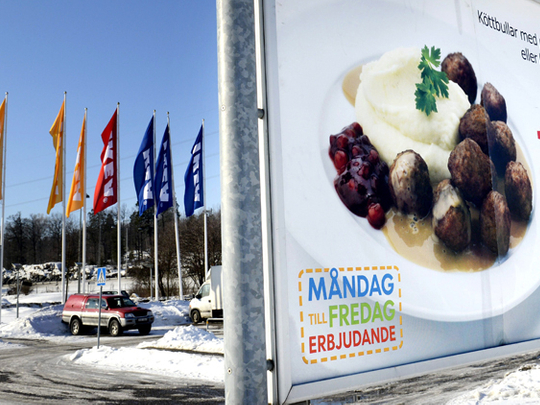
Brussels: Czech authorities said Monday they have detected horse meat in meatballs labelled as beef and pork for a Swedish furniture retailer giant, while European Union officials met to discuss tougher food labelling rules to counter the developing scandal.
The horse meat was found in one-kilogram packs of frozen meatballs made in Sweden and shipped to the Czech Republic for sale in Ikea stores there, the State Veterinary Administration said. A total of 760kg of the meatballs were stopped from reaching the shelves.
Ikea’s furniture stores feature restaurants and also sell typical Swedish food, including the so-called Kottbullar meatballs.
It was not immediately clear whether Ikea exported the same product to other countries. Calls seeking comment from Ikea in Sweden were not immediately returned Monday.
The Czech authority also found horse meat in beef burgers imported from Poland during random tests of food products.
Authorities across Europe have started doing random DNA checks after traces of horse meat turned up in frozen supermarket meals such as burgers and lasagna beginning last month.
The European Union’s agriculture ministers gathered in Brussels Monday to discuss the widening scandal’s fallout, with some member states pressing for tougher rules to regain consumer confidence.
The 27-nation bloc must agree on binding origin disclosures for food product ingredients, starting with a better labeling of meat products, German agriculture minister Ilse Aigner said.
“Consumers have every right to the greatest-possible transparency,” she insisted.
Austria backs the German initiative but others such as Ireland say existing rules are sufficient although Europe-wide controls must be strengthened to address the problem of fraudulent labelling.
The scandal has created a split between nations such as Britain who see further rules as a protectionist hindrance of free trade under the bloc’s single market, and those calling for tougher regulation.
Processed food products - a business segment with traditionally low margins that often leads producers to hunt for the cheapest suppliers - often contain ingredients from multiple suppliers in different countries, who themselves at time subcontract production to others, making it hard to monitor every link in the production chain.
Standardised DNA checks with meat suppliers and more stringent labeling rules will add costs that producers will most likely hand down to consumers, making food more expensive.












